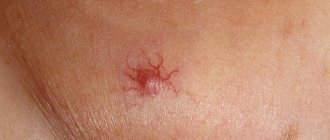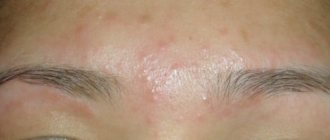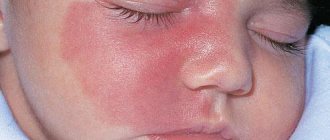The process of sweating is not unusual; it is a natural process.
However, increased sweating may indicate a developing cold or a more serious illness, so you should absolutely not ignore the problem in question.
A woman’s body really has reasons for sweating in her sleep. A logical question arises: how to distinguish normal sweating from excessive sweating?
What are the reasons
Night sweats in women are not considered normal if they lead to the following consequences:
- bed linen and underwear become wet to such an extent that they have to be changed;
- sweating leads to sleep disturbances.
If a woman sweats at night in her sleep, she should pay close attention to this.
The causes of night sweats in women must be diagnosed as early as possible. Increased sweating is usually caused by diseases or pathologies from the following list:
- changes in hormonal levels that make themselves felt during gestation and the menstrual cycle;
- menopause - this condition is especially noticeable in women 40, 45, 50 or more years old.
- disturbances in the functioning of the ovaries;
- problems with the organs of the endocrine system;
- infectious diseases, the symptoms of which include febrile conditions;
- rheumatoid arthritis;
- malignant formations;
- allergic reactions;
- multiple sclerosis or depression;
- emotional stress that persists for a long period of time;
- alcohol or drug addiction;
- side effect from treatment with certain drugs.
You should not discount external factors, such as too tight clothing and/or uncomfortable air temperature in the bedroom. It turns out that if a woman sweats a lot at night, the reasons can be quite different and to determine them it is necessary to undergo diagnostics.
We recommend reading: Reasons for waking up wet in sweat in the middle of the night
As mentioned above, pharmacological factors are sometimes the cause of night sweats in women. Treatment with drugs from the following groups leads to increased sweating:
- antihypertensive;
- psychotropic;
- antipyretics;
- steroid hormones.
Ways to eliminate sweating
The first steps to normalize night sweats are improving external conditions, changing your lifestyle and diet. For sound sleep and proper functioning of the sweat glands:
- the bedroom should not be hot; it is useful to ventilate the room before going to bed;
- in the summer, you should not sleep under a warm blanket: to avoid freezing, a light sheet is enough;
- bedding and sleepwear are chosen from natural materials - linen, cotton, bamboo fiber, silk;
- An effective way to relieve tension, fatigue and improve the functioning of the endocrine system before bed is a warm (but not hot) bath with healing infusions;
- 2-3 hours before bedtime, you should not overeat, drink strong tea and coffee, or eat spicy foods;
- Avoid playing sports in the evening and reduce physical activity before bed.
Other causes of excessive sweating
Severe sweating at night in women is often caused by hormonal reasons, these traditionally include:
- the period before the monthly cycle;
- hormonal changes throughout pregnancy;
- menopause.
The cause of night sweats in women before menstruation is often a significant concentration of estrogen in the blood, and this is normal. Night sweats often occur in women during pregnancy, becoming a false cause for real panic.
During the first trimester, the water-salt balance is significantly disrupted (this is due to decreased estrogen levels), which becomes the cause of night sweats in women. The question “why do I sweat at night in my sleep?” many women ask. Unfortunately, sometimes the answer to this question is pathology.
What pathologies can night sweats be a symptom of?
Women's sweating in a dream can indicate serious illnesses. As a rule, a visit to the doctor helps to quickly determine the root of the problem:
- natural causes of increased sweating are detected, treatment and additional diagnostics are not required;
- specialists identify the pathology, further actions are determined depending on the situation.
Night sweats in women can be associated with the following pathological conditions:
- tuberculosis;
- endocarditis;
- malignant formations;
- AIDS;
- osteomyelitis;
- diabetes;
- hyperhidrosis.
The cause of women sweating during sleep is often pathologies of the central nervous system.
Traditional recipes for excessive sweating
Sweat production can be reduced by using folk remedies:
- Chamomile infusion: pour 6 tablespoons with 2 liters of boiling water and after a few minutes add 3 tablespoons of soda.
- Vodka tincture of horsetail or walnut leaves (1 to 10).
- Decoction of oak bark with lemon juice (1 teaspoon per 200 ml of boiling water).
For emotional breakdowns and nervousness, wet wipes and a slice of lemon help temporarily. Sage is also effective, which is used both internally (in the proportion of 1 teaspoon per 1 glass of boiling water, drink 2 tablespoons twice a day for 2 months), and externally (4 tablespoons per 1 liter of boiling water) in the form of baths.
Poor nutrition as the cause of the problem
A woman experiencing unpleasant night sweats should reconsider her daily diet. They can be caused by excessive consumption of the following foods:
- spicy food additives;
- sour foods;
- excessively fatty and salty dishes;
- Drinks with caffeine can also cause increased sweating at night in women.
Severe night sweats, both in men and women, are often caused by alcohol abuse; attention should also be paid to this factor.
Factors that provoke intense sweating at night in men
Hyperhidrosis, which is excessive sweating, is a social problem that has plagued a large percentage of the population. Women's and men's physiology is slightly different, so the causes of night sweats may vary. If we consider men, then clammy sweat at night can be caused by the following factors:
- A sharp decrease in blood pressure.
- Existing diseases of the cardiovascular system.
- Frequent headaches. If a man suffers from migraine, then a large amount of adrenaline enters the blood, which causes increased sweating.
It is important to determine the cause of persistent migraines. It could be a common cold or a serious disease of the internal organs.
- Alcohol abuse. Toxic poisoning of the body by the breakdown products of ethyl alcohol causes perspiration to appear on the body. Even with moderate alcohol consumption, thermoregulation processes are disrupted, which may be accompanied by sweating or chills.
- Against the background of constant stress, emotional overload and conflicts at home or at work, idiopathic hyperhidrosis develops. This disease causes sweating not only at night, but also during the day. A person feels wet palms and a rapid heartbeat appears.
- A hormonal imbalance can cause night sweats. Testosterone is released either in large quantities or synthesis is reduced. This problem often occurs in adolescence or in old age with sexual dysfunction.
In the male body, the likelihood of producing cold sweat increases with infectious pathologies, influenza, and viral diseases.
If a man wakes up every morning all wet from sweat, then one can suspect the presence of serious problems. For example, diabetes or tuberculosis. Intense sweat is a reason for urgent consultation with a doctor.
What to do if the problem is not related to the disease
If a woman sweats at night, but doctors confirm that she is healthy, then the reason for the difficulty lies in another plane.
Sweating during sleep may be due to the following:
- Night sweats in healthy women are often associated with high room temperature. The ideal temperature for sleep is 18 - 22 degrees.
- The cause of severe sweating at night in women is often poor-quality (synthetic) bedding and underwear.
- The air in the room for sleeping should be not only cool, but also fresh, so installing an air conditioner only partially solves the problem. If you sweat heavily, it is necessary not only to cool the air in the room, but also to ventilate it.
- If a woman sweats a lot in her sleep, then she should reconsider her menu. Severe sweating during sleep at night can be associated with a lack of balance in the diet. Fried, spicy, hot and fatty foods should be excluded from the menu in the second half of the day, and their consumption should be limited in the first half.
Tips for stopping night sweats
If no developing illnesses were found during the examination, night sweats can be reduced if you follow simple tips.
- Adjust your lifestyle a little: walk more in the fresh air, do some physical activity.
- Sleep in a room where there is access to fresh air.
- Use bedding and leisure clothing made from fabrics of natural origin.
- Take water procedures before bed; a contrast shower is especially useful.
- Review your diet and give preference to healthy foods, fresh fruits and vegetables.
- Get rid of bad habits.
- Worry less and learn to reduce stress to a minimum.
How will medical care be provided in the context of this situation?
A problem such as severe sweating during sleep in women really requires attention from doctors, since it can be a harbinger of serious health problems. To find out why a girl sweats at night, you first need to see a therapist.
Having collected an anamnesis, the doctor will refer the patient for tests and examinations that he considers a priority in the context of her situation. In order to establish the causes of severe sweating during sleep in women, a detailed blood test of the patient is often sufficient.
Sometimes, in order to form a clear picture of the problem and reliably determine why a woman sweats in her sleep, consultation with the following specialists may be required:
- neurologist;
- endocrinologist;
- cardiologist;
- gynecologist;
- oncologist;
- allergist;
- psychiatrist.
The procedure for treating night sweats in women is determined based on the reasons for the current situation. Many years of practice show that consistent therapy allows you to solve the problem in the shortest possible time.
Why you shouldn't put off visiting a doctor
If a woman sweats in her sleep and does not understand the reasons, based on the material presented above, then she should seek help from a doctor because:
- sweating during sleep in women, regardless of its causes, causes a lot of unpleasant sensations;
- the cause of profuse sweating at night in women can be serious pathologies, and the sooner the patient sees a doctor, the fewer consequences she will have to face;
- Severe sweating in women, including during sleep, may have nothing to do with their state of health, but it clearly does not bring joy.
One cannot discount the fact that severe night sweats in women affects the quality of sleep, which in itself leads to irritability and subsequent disturbances in the functioning of the central nervous system.
Modern diagnostic methods help determine why women sweat at night. And if a woman is faced with a problem like night sweats, then the right decision would be not to put off a visit to a specialist.
Determining at home why women's bodies sweat at night is problematic.
It should be taken into account that sweating during sleep has an unpleasant psychological aspect: realizing that what is happening is not the norm, the patient begins to get nervous and feel uncomfortable, which in turn can result in large-scale depression. A woman can be completely healthy, but an experienced doctor will firstly confirm the normal state of the body, and secondly, explain the reasons for the unpleasant phenomenon. To stop sweating heavily at night, it is often enough for a woman to change her underwear or open a window for ventilation.
Sweating during sleep in women may not be of a medical nature, but of a domestic nature, however, visiting a doctor and making sure that everything is in order will not be superfluous; taking care of your health should come first. Another piquant facet of the problem is that a woman who sweats while sleeping at night causes discomfort to the person with whom she shares the bed.











